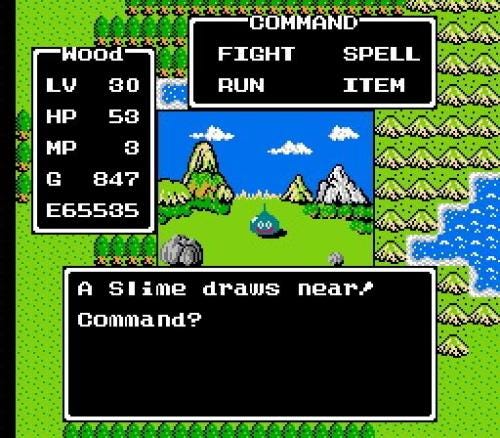Released: May 27, 1986
Version played: Switch Port (2019)
It’s still a masterpiece.
That’s the thing you have to understand about Dragon Quest. Yes it’s simple, not even reaching the level of what might commonly be referred to as “game mechanics.” Every battle is a pure numbers game with the only strategy being that you should probably heal when your health gets low. Yes, it’s also grindy, even in its modern ports. To defeat the Dragonlord you will have to fight the monsters standing right next to the Dragonlord a whole bunch, while he patiently waits for you to get strong enough to kill him.
None of that matters.
Actually it’s even more than that, the simplicity isn’t a blemish to be tolerated by the burgeoning start of a new genre, it is in fact the central pillar of Dragon Quest’s genius. To reduce Wizardry and Ultima to their barest essentials until nothing remains, a series of keys and locks spread across a vast open world, Dragon Quest reinvents the RPG as a true adventure game. The rate at which new clues are introduced to the player, and solutions made clear is so precisely calibrated as to make the game almost impossible to put down. Oh let me just get that one shield. Actually now I’ve got that I can see what’s in this shrine. Wait, he needs a harp? I think they mentioned one was buried with Galen in Galenholm. Why on earth does the Princess tell me my distance from the Castle how could that possibly be useful – oh shit it’s decoding the path to the Mark of Erdrick! And before you know it it’s been five hours and the Dragonlord is dead.
Not content with inventing the adventure game once, Yuji Horii decided to do it twice. If Portopia is a playable detective movie then Dragon Quest is a fantasy epic, as you gather legendary relics alongside proof of your noble bloodline and rid the world of evil once more. It is this second person nature which defines Dragon Quest, the genre starts not with a “silent protagonist” or even a “self insert,” but truly just “you,” the only party member, the hero, star of choose-your-own-adventure books and childhood fantasies.
“You” is crucially not anyone, “you” is Male and Young. I wouldn’t call these defining characteristics so much as boundaries that Dragon Quest places on its imagined audience. The youth of the protagonist is more malleable and as such more interesting, Dragon Quest is famously an all ages franchise to the point where today we can be honest and say it is for old ass men. The game is made with a knowing and warm nostalgia, its goofiness twinned with a hint of melancholy that comes from looking back on the simplicity of childhood, a hint that others like Shigesato Itoi (Mother) and Kaz Ayabe (Boku No Natsuyasumi) would drag to the forefront of their works. But “your” gender in Dragon Quest is etched in stone; if Dragon Quest has a narrative it is that of a boy becoming a man through their own strength and ancestry. “You” are better, and certainly special, blessed by holy lineage, but you must also prove yourself worthy of such a status through hard fought masculine strength, courage and resilience. You leave home and brave the wilderness to become strong, and with that strength slay dragons, for which you are rewarded with the undying love of the princess.
This isn’t a biting criticism, I don’t think Dragon Quest would be better if it deconstructed the foundational myths of its genre and their interfacing with gender as a method by which heroism and bravery itself is made masculine. It’s a fucking game where you press A and every monster dies. I bring this up to highlight the earnestness with which Dragon Quest reproduces its genre. This is not a game where the church is evil; this is not a game where you kill god. It is a straightforward restoration fantasy, its towns filled with comedic and charming characters but be they hapless, wise or terse they are all generally good people who help you if they can. Similarly, the lineup of incredible creature designs are merely beasts, either creatures of the wild or minions of the Dragonlord. They don’t have culture or personhood, they exist entirely as cute and contextless designs to fight. There are kings and nobility but no aristocracy, the signifiers of wealth but no class. All that is sanded off for pure fantasy, a world that is unreal but instantly familiar in its strict adherance to genre conventions.
Over the decades we are about to see a lot of games that attempt to introduce some of these complications and critiques into the body of their work, but at the same time still embrace the core fantasy and almost rip themselves in two at the sheer dissonance of the attempt. Dragon Quest has no such insecurity. It loves fantasy stories, you love fantasy stories, let’s slay the Dragon and marry a princess.

